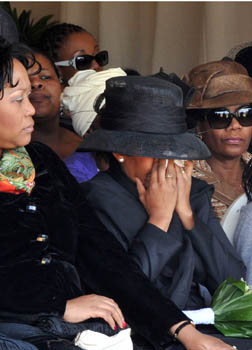
Credit: Wikipedia.org
Traditions aren’t static. They constantly warp and evolve with every new generation. This is especially true in South Africa, as younger generations living in urban areas have adopted a brand new burial tradition: after-tears parties.
An after-tears party is a time to drink, listen to music and fondly remember a loved one who died. Some parties are relatively subdued, with only a handful of guests telling stories about their most treasured memories. Others are loud and boisterous, bordering on disrespectful. Since this is a relatively new tradition, details vary depending on the hosts.
Although many young people have found comfort in this new tradition, some of their elders aren’t terribly keen on the idea. That’s because most families in South African cities adhere to strict funeral rites that focus on respect above all else. Many elders view anything outside of these traditions — especially a party — as a sign of extreme disrespect not only for traditions, but for the loved one who died.

Credit: Flickr.com
In South Africa, many families believe that people who die receive a new body in the afterlife and become an ancestor. Most people also believe that funeral rites must be carried out according to tradition. If they are not, their loved one will either wander lost in the afterlife or bring misfortune to the family.
To protect themselves and honor their loved one, people in urban areas will smear their windows in ash, cover any reflective surface in the house (like mirrors or TV sets) and remove all beds and bedding from the loved one’s room after death. In some cases, tradition requires that children and people who aren’t married stay away from the funeral to ward off misfortune. During the funeral, no one is allowed to speak or make any unnecessary noise. And once the funeral is over, family members usually spend a full week at home with no outside social contact at all.
In this atmosphere, it’s easy to see why young people have decided to throw their own after-tears parties. Since they are often either too young to attend the funeral or not yet old enough to be married, they don’t get the comfort that a funeral can bring. By spending time with their friends and family in a relaxed setting, they can remember their loved ones and release some of the stress that comes with losing someone they love.
On the other hand, it’s also easy to see why elders are worried about the impact of after- tears parties on their traditions. Many of these parties are in direct violation of the solemn, silent, no-socializing rules that have been in place for centuries. Many elders believe they will bring misfortune to both the living and the person who died.
Some elders also worry that the parties are an excuse for young people to drink in excess, and that the message of mourning has been lost. This is true in some cases, although most after-tears parties try to balance respect and revelry.

Credit: Flickr.com
As with any new tradition, a sense of respect is a primary concern. The most effective after-tears parties focus on the person who died, not on drinking and socializing. The alcohol, conversations and music should be secondary. Some hosts will only play music that their loved one enjoyed, or focus their attention on telling heartwarming or humorous stories about them
Everyone grieves differently, even in cultures with strict funeral rites. What is a case of disrespect to an older person can be a young person’s vital coping mechanism after losing someone they love. As this new tradition continues, we’ll likely see it evolve even further and outgrow some of its more disrespectful components.

 The Evolution of After-Tears Parties in South Africa
The Evolution of After-Tears Parties in South Africa


 John Mulaney’s “Funeral Planning” on Netflix: No Real Plan
John Mulaney’s “Funeral Planning” on Netflix: No Real Plan

 Composting Bodies Is Now Legal in a Dozen States
Composting Bodies Is Now Legal in a Dozen States














